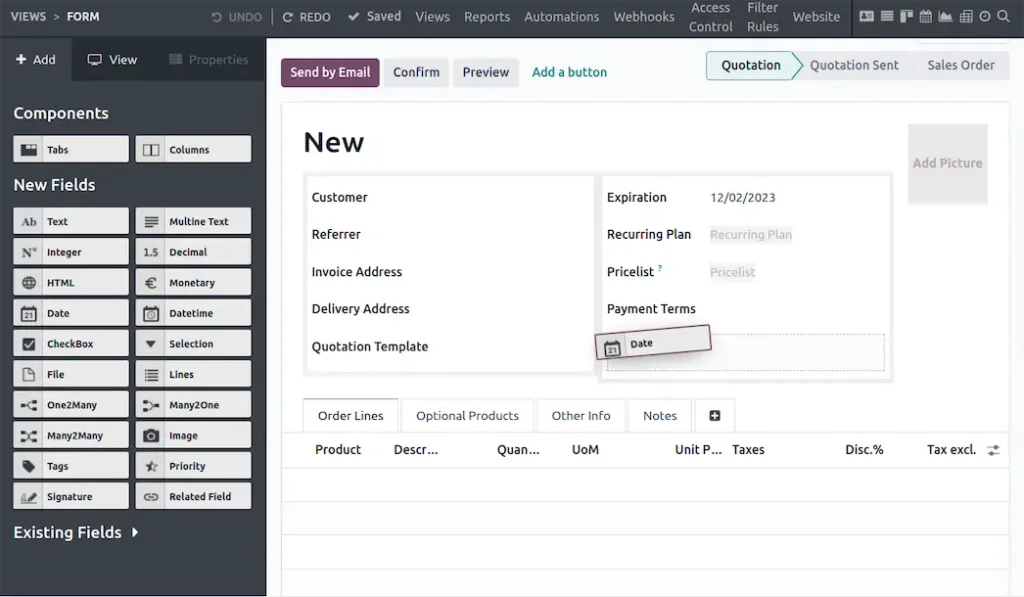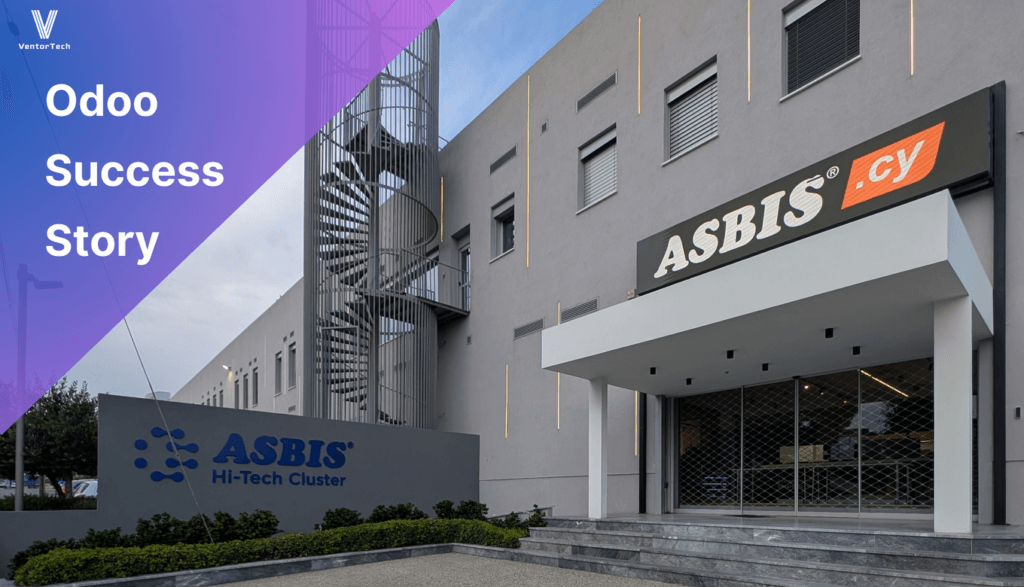Modern businesses are forced to operate in an ever-changing environment and quickly adapt to technological innovations in order to remain competitive and provide relevant services or products. In order to better control all business processes, companies are implementing ERP, software systems that help organizations optimize core business processes and provide a single source of reliable information.
Technology is constantly changing and improving, and it is essential that ERP systems are able to adapt to new user needs and business processes. In addition, the developers of ERP systems are constantly working to improve them by periodically releasing updates. However, as time goes by, the performance of ERP systems decreases, and this has a serious impact on the productivity of the company.
Consequently, legacy tools cannot keep up with the load, and, as a result, the system becomes insufficiently flexible and does not provide information transparency. In addition, it affects the productivity of the company, because the insufficient set of functions does not allow for the full realization of the potential. In this article, we will talk about the top reasons why choose Odoo ERP, compare this system with other popular ones in the market, and explain why it is better to migrate to Odoo right now.
Reason 1: Cost Efficiency vs Traditional ERPs
The key purpose of the ERP system is to integrate all business processes into a single platform, thus optimizing the work of processes and increasing the efficiency of the company. Cost efficiency is the indicator of the extent to which the implementation and use of the system lead to cost reduction and increased profits. This is one of the most important factors in the implementation of the ERP system. In fact, if we compare Odoo vs SAP / Oracle / NetSuite and other traditional systems, we can see that Odoo is a much more cost-effective ERP solution, and below, we will explain why.

Odoo vs SAP
Odoo is a modern ERP system that is built on a modular structure and can easily meet the needs of businesses of any size and direction. Odoo can improve the economic efficiency of the company through several methods, such as optimizing and automating business processes, analyzing data, and improving reporting.
SAP ERP is also quite a popular system and consists of modules, which makes it quite flexible. The economic efficiency of SAP is that it helps to optimize business processes and reduce costs in some areas of the company’s activities.
Odoo vs MS Dynamics
A specific feature of Odoo ERP is its open-source code, which makes this system extremely flexible. In addition, it significantly reduces licensing costs and can be easily adapted to the ever-changing needs of the company. Thus, Odoo is a rather cost-effective ERP solution, especially for businesses that are constantly growing and developing.
MS Dynamics is a platform of business applications for business process management. These solutions help to optimize and automate processes and increase customer engagement. This system is easily scalable, and hence its implementation is quite simple.
However, unlike Odoo, MS Dynamics does not include service and quality control, and PLM functions, which can negatively impact cost-effectiveness. In addition, MS Dynamics does not integrate with advanced HR solutions. When comparing these two systems, Odoo is a great fit for any business, while MS Dynamics is one of the best ERP for small business.
Odoo vs NetSuite
Both of these ERP systems are actively used by enterprises to optimize and automate business processes, as well as for resource management. Both have their advantages and disadvantages, and the choice depends on the needs of a particular business. Odoo is an open system with a modular structure and can be easily adapted to individual needs. NetSuite is a cloud-based system that offers a huge number of ready-made functions and integrations.
The advantage of Odoo is that it meets a wide range of business needs and goes beyond the functionality of MRP. NetSuite, on the other hand, is a basic MRP solution that lacks many functions, such as maintenance, quality, or planning. In addition, NetSuite also relies on many integrations that are not its own, which complicates access and calls into question cost-effectiveness.
Odoo vs Zoho
These two systems are quite different and are suitable for different business needs. Odoo covers almost all areas of business, from production and sales to financial management and CRM.
Zoho is a cloud-based platform that is easy to use and is great for small and medium-sized businesses. It is crucial to realize that Zoho is first and foremost a CRM platform that offers the ability to integrate with other modules.
The choice depends solely on your needs. If your company needs a complete integrated system, then Odoo will be the best choice. However, be prepared to spend some time learning the system. If, on the other hand, you need a system that is simple and easy to use, then Zoho will do. But you should keep in mind that it may not integrate well with some modules.
Odoo vs 1C
The difference between these ERP systems is that they target different types of users and business needs. 1C focuses mainly on accounting, financial management, and fixed asset management. At the same time, Odoo is suitable for managing all company processes, from production to CRM and logistics. Odoo offers a more flexible interface and customization capabilities, which have a positive impact on cost efficiency.
1C is less flexible and has limited capabilities for managing complex processes. In addition, the integration of 1C is more complex compared to Odoo.
Reason 2: Modular and Scalable Architecture
One of the most popular reasons to use Odoo is its modular structure. This system integrates over 200 modules, allowing it to cover all the needs of a company of any size. In addition, this huge number of modules also makes Odoo a highly scalable system that will grow with your business.

Pay for What You Need
This is a very cool feature of Odoo, which is that you can only implement the modules that you plan to use. There is a feature of Odoo pricing that is important to explain. The thing is that you pay for users, but you get access to other modules in a standard way.
As for implementation, configuration, and data migration, you can actually do it step by step, by paying for these services. For example, you can first adjust the “Accounting” module and use the other features by default, and then move on to adjust another module.
Add Modules as You Grow: Benefits of Switching to Odoo ERP
A company of any size and direction can start with basic Odoo modules and gradually expand the functionality of the system as the business grows. Odoo real-life case studies include Toyota, as this company uses Odoo to manage global operations across a huge number of subsidiaries.
What is more, the Odoo scalability is confirmed by the fact that a company that uses this system to serve 200-300 users has the ability to scale to serve several thousand users!
Reason 3: All-in-One Ecosystem
Probably the most popular reason to migrate to Odoo is that you get everything in one system. Instead of using several different programs that often have duplicate functions and cause data loss, you can get all the tools in one ecosystem.

Odoo is an ERP with CRM, Accounting, Inventory in one, which is convenient for any business. But in fact, these are by no means all the main modules of the system. Others can also include Planning, Sales, Production, Service, Expenses, and Purchasing. Below, we take a closer look at some of them.
Accounting
- speeding up the reconciliation of mutual settlements and filtering
- simplified dynamic reports
- possibility to forecast payments of future periods
- reconciliation of documents in online mode
- providing data exchange with the bank
- possibility to track debts
- minimizing the labour intensity of creating a balance sheet
Inventory
- real-time warehouse management
- generation of all reports of any complexity
- automatic replenishment of stocks
- possibility of conducting an inventory of goods
- possibility of end-to-end warehousing and registration of direct shipments
- possibility of tracking stock movement
Sales and Purchase
- formation of commercial proposals and ordering
- support for online payment
- possibility to automate retail outlets and analyze revenues
- accelerated preparation of purchase orders in automatic mode
- possibility to plan the receipt of goods and reconciliation of accounts
- conducting a comprehensive analysis of the work of departments
In addition, Odoo allows companies to visualize sales funnels, quickly create professionally designed sales offers, reduce manual data entry, automate most processes, and many more useful features.
Reason 4: Customizable and Open-Source

Odoo customization is another strong point of this system. This ERP is as flexible as possible, allowing users to customize individual modules to solve specific business tasks. For example, using such customizable ERP software as the Odoo Studio module, you can easily add fields, optimize workflows, and create new insights.
Open source ERP advantages include the ability to customize the system to meet specific business processes and needs. This method of software development makes Odoo an attractive option for users around the world. What is more, open source provides transparency into the system’s operation, which ensures greater control and insight.
Reason 5: Active Community and Constant Updates
Odoo is an extremely user-friendly ERP for SMEs, and it has more than 20,000 users worldwide. An active community is one of the keys to the company’s success, as it provides user support and increased security. Odoo’s active community provides a platform for sharing impressions of the system, sharing experiences, and solving problems that may arise during the use of the system.

Odoo ERP benefits include a lot of aspects, and one of the most prominent is constant updates. This ensures stable system operation and compliance with technological standards. In addition, the functionality of Odoo is constantly improving through constant updates, and users appreciate it. Such updates may include Odoo usability and interface improvements, development of new modules, implementation of new technological solutions, or bug fixes.
Why Migrate Now (and not Later)
If you are on the lookout for integrated business management software, you should definitely check out Odoo. We have compared Odoo vs other ERP systems, and as you can see, Odoo prevails in most features.
If your system does not cope with the huge amount of data, does not meet the current requirements of your company, or is difficult to integrate with other systems, these are the reasons to change ERP system.
Utilizing a more modern ERP system is critical to business success in 2025. ERP modernization will bring your company many benefits, including:
- improved customer service
- the ability to automate processes and increase efficiency
- better competitiveness in the market
- up-to-date data
Cost of Delay
First of all, it is crucial to explore ERP migration challenges and solutions before you start migrating, but it is essential to realize that the delay can cost your company a lot, and below, we will explain to you why.
- Reduced productivity. Outdated systems can almost never be updated to modern business needs and, consequently, be less functional. Migrating to Odoo for business will improve efficiency and introduce new features.
- Cost escalation. Inefficient operation of an outdated ERP can result in significantly higher resource and error resolution costs. Modern ERP software for digital transformation can help automate business processes and increase productivity, and therefore reduce costs.
- More expensive upgrades in the future. By migrating to a new ERP system now, you insure yourself against the risk of needing a more complex and expensive upgrade. The thing is that the longer you wait, the more changes are made to the ERP systems, and these changes will be more difficult and expensive to install later than they are now.
Legacy Pain Points
In addition to the higher financial cost of using legacy ERP systems, it also has many other disadvantages.
Lack of scalability. Modern companies grow and develop rapidly, and legacy systems cannot keep up with them. Scaling them is difficult and costly to adapt to new processes. In addition, outdated ERPs cannot connect to the cloud, which significantly limits a company’s options. Odoo is a cloud-based ERP solution, thus making the user experience limitless.
Incompatibility with innovations. This significantly limits a business’s ability to use modern technology to optimize processes, and thus hinders its growth. What is more, the company will not be able to quickly adapt to changing trends and user requirements, which will put it at a competitive disadvantage in the market.
Security issues. Typically, legacy ERP systems lack the robust security features necessary to protect data from modern cyber threats. Legacy systems lack strong encryption, regular updates, and bug fixes.
Discover How Odoo ERP Can Transform Your Operations!
How VentorTech Handles ERP Migration Smoothly
ERP migration is a very responsible process that will be best entrusted to professionals in this field. Many modern businesses cooperate with VentorTech because our company has extensive experience in implementing and customizing Odoo ERP for businesses in different industries. VentorTech specialists are the experts who can help you streamline operations with Odoo and take your company’s profitability to the next level.
In addition to implementing Odoo ERP, the VentorTech team will quickly and competently train your employees on how to use it. Our special feature is that we adapt Odoo to the specific requirements of your company!
We have been helping businesses migrate to Odoo since 2012, and we know all the peculiarities of this process and how to solve the complexities. In addition, we accompany our clients at all stages of migration, providing support in case of difficulties.
While you are still questioning whether to migrate to Odoo, your company’s costs are rising. It’s time to explore the Odoo advantages and contact VentorTech for a consultation, where your questions will be answered and all your doubts will be dispelled!
Recommended articles:
- Total costs of ownership (TCO) for any ERP system
- Odoo Enterprise License Pricing and How to Reduce Cost
- How to install Odoo on your server using Odoo install script
- Odoo Implementation Steps
- Half a million Euros’ profit from Odoo ERP integration – a high-end cigar business success story
----------------------------------------------------------------------
Education: Bachelor's degree.
----------------------------------------------------------------------
Experience:
Marketing manager
VentorTech
----------------------------------------------------------------------
Current position: Marketing manager VentorTech
----------------------------------------------------------------------
B2B Marketing
Google Tag Manager and GA






0 Comments